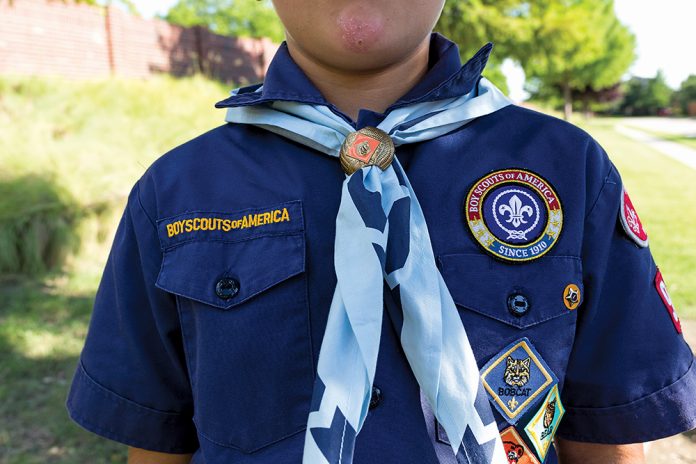This fall, Cub Scout Pack 946 in Frisco will likely look much different than it ever has before. For the first time since it was established nearly a decade ago, the group’s 50 boy members, ages 7 to 10, in grades first through fifth, will officially welcome girls into their pack as registered, uniform-wearing members. As part of all-female “dens” (smaller groups that exist within Cub Scout packs), they will attend monthly pack meetings at Allen and Bledsoe Elementary schools.
The change comes following a historic and controversial decision made late last year by the Irving-based Boy Scouts of America (BSA) organization to begin allowing girls into its Cub Scout program as part of its “Scout Me In” recruitment campaign that kicked off in May. Going forward, Cub Scout packs will consist either of all-boy or all-girl dens or a mix of boy and girl dens.
 Reportedly, more than 3,000 girls have already officially joined the organization this year as members of the 170 packs nationwide that opted into an Early Adopter pilot program. Circle Ten Council, which oversees Scouting in several North Texas and Southern Oklahoma counties, including in Frisco, did not participate in the program. (Council executives did not respond to requests for comment for this article).
Reportedly, more than 3,000 girls have already officially joined the organization this year as members of the 170 packs nationwide that opted into an Early Adopter pilot program. Circle Ten Council, which oversees Scouting in several North Texas and Southern Oklahoma counties, including in Frisco, did not participate in the program. (Council executives did not respond to requests for comment for this article).
In 2017, Cub Scouts boasted a membership of more than 1.2 million boys nationally. According to a press release posted on BSA’s website, the Scout Me In campaign “celebrates” the organization’s expanded service to families and “reinforces that the mission and core values in the Scout Oath and Scout Law are welcoming, inclusive and foundational for both young men and women.”
Pack 946 is chartered (or sponsored) by First Frisco United Methodist Church. Cubmaster Ryan Hobbs, who participated in Scouting as a kid and is the father of three boys who also are Scouts, says it will become a co-ed pack featuring boy and girl dens. Mr. Hobbs and his fellow pack leaders have already addressed the upcoming change with their young members. “For the most part, it was not a big deal,” he shares, since many of the boys’ sisters already attend pack meetings and family campout events. “For this age group, I really do not think, at the end of the day, it is going to be hugely impactful if people follow the guidelines. For us, I do not see it being a big difference.”
Other changes in the works at BSA are also making headlines.
 In February 2019, the Boy Scouts program for boys age 11-17 will undergo a name change and become Scouts BSA. Having served more than 800,000 young men nationally last year, it too will welcome females into its troops. As part of single-gender troops (co-ed or “mixed” troops will not be allowed), girls may pursue the organization’s highest rank of Eagle Scout. On the BSA website, Michael Surbaugh, the chief Scout executive, says, “We strive to bring what our organization does best – developing character and leadership for young people – to as many families and youth as possible as we help shape the next generation of leaders.”
In February 2019, the Boy Scouts program for boys age 11-17 will undergo a name change and become Scouts BSA. Having served more than 800,000 young men nationally last year, it too will welcome females into its troops. As part of single-gender troops (co-ed or “mixed” troops will not be allowed), girls may pursue the organization’s highest rank of Eagle Scout. On the BSA website, Michael Surbaugh, the chief Scout executive, says, “We strive to bring what our organization does best – developing character and leadership for young people – to as many families and youth as possible as we help shape the next generation of leaders.”
Jennifer Bartkowski, the chief executive officer of Girl Scouts of Northeast Texas, is not sure that is a good idea. “I think that changing your name does not make you an expert in girls,” she says. The local council oversees 25,000 Girl Scouts in 32 counties, including approximately 2,200 in Frisco. Nationally, Girl Scouts of the USA has “been doing this for 106 years,” she says. “We are the experts in girls. We know how girls learn and lead best. We think the best place for girls is a single-gender environment that has the history and the expertise in girls.”
When parents consider their daughters’ needs, Ms. Bartkowski says, “They are looking for an organization that is an expert in building girls’ confidence. They are looking for an organization that can help their daughters take safe risks and develop critical-thinking and problem-solving skills.” Girl Scouts sometimes “gets dismissed as (being about) cookies, camps and crafts,” she shares. “We are absolutely all of those things, and so much more.”
For proof, look no further than the $14 million renovation the Northeast Texas council recently completed on Camp Whispering Cedars in South Dallas. A STEM Center of Excellence, the 92-acre facility is a “living laboratory” that features buildings, amenities and programming designed to teach girls about science, technology, engineering and mathematics. “We are as committed as much as we ever have been to an outdoor adventure and an outdoor leadership experience, and girls can absolutely have that in Girl Scouts,” she says.
While Ms. Bartkowski says she knows some girls ultimately will join Cub Scouts and Scouts BSA, she does not anticipate a membership decline among troops in the Northeast Texas council. “We are going to continue doing what we do best for girls, and hopefully be able to serve more girls in our area going forward.”
Meanwhile The Church of Jesus Christ of Latter-day Saints (LDS), which for more than a century has chartered Cub and Boy Scout troops nationwide, in which hundreds of thousands of its male members have participated, announced in May that it will part ways with BSA effective December 31, 2019.
According to published reports, some 425,000 LDS young men participated in Cub and Boy Scout programs in 2017 and comprised more than 18 percent of BSA’s total youth membership. In a joint statement with BSA posted on the official LDS website, the church says it plans to implement its own “uniform youth leadership and development program that serves its members globally.” Details about the program, which is set to begin in January 2020, have not been disclosed.
 Gordon Wright, a spokesman for the LDS Church in North Texas, explains, “Currently, in the church, we have more young (members) outside the U.S. than in the U.S., and so they have been trying to look at a more global, consistent program that would build unity among the young people wherever they are.” He estimates there are currently as many as 2,000 boys participating in up to 200 LDS-chartered packs and troops throughout North Texas.
Gordon Wright, a spokesman for the LDS Church in North Texas, explains, “Currently, in the church, we have more young (members) outside the U.S. than in the U.S., and so they have been trying to look at a more global, consistent program that would build unity among the young people wherever they are.” He estimates there are currently as many as 2,000 boys participating in up to 200 LDS-chartered packs and troops throughout North Texas.
An Eagle Scout, Mr. Wright is the father of four sons who also earned the rank. For several years, he served on Circle Ten Council’s executive board and participated in one of its executive committees. “I think there are lots of wonderful values and character traits in Scouting that have added a great deal to both the church, and certainly to my family. It is a very valuable program,” he explains. “That said, I have great faith in the decisions (of church leaders), so I am confident this will ultimately be a good thing, certainly for the young men in our church, but I also think it will be a good thing for all.”
Despite its impending separation from Scouting, Mr. Wright is quick to explain, “The church is not saying we do not want our people involved with BSA. That is not the message.” Church members and families likely will be allowed to participate in either of the organizations’ programs, or both, if they choose. However, he says, “It would be naive of me to think that we will still have as many (LDS) people involved in Scouting as we do now. I do not think that will be the case.”
Mr. Hobbs, of Pack 946, has “mixed feelings” about the changes coming to Scouting. “I think they are doing what they need to do to maintain relevancy in today’s society, and the changes that society in the U.S., specifically, is experiencing,” he says. “We are going to adopt it. We are going to move forward.”
How will the changes to these programs impact our youth in Frisco? What are the next steps for local groups? Time will tell.


